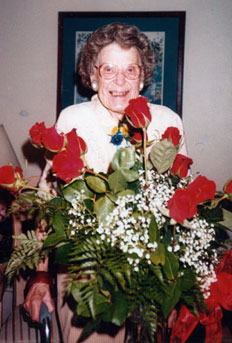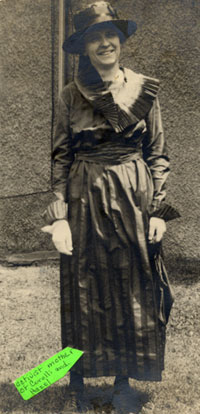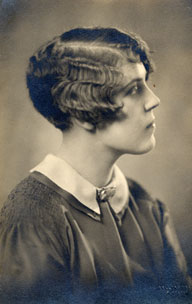
Corelli Nelson Shoup at her 100th
birthday, Aug. 8, 2004 |
This is a first for the Freedom From Religion Foundation. At 100 years of age, Corelli Nelson Shoup of Stevens Point, Wis., has become our newest Lifetime Member. Corelli, named for the novelist Marie Corelli, was born on August 8, 1904, in Henning, Minn.
Corelli’s mother, Annie Peterson Nelson, came of strong, courageous Swedish immigrant stock, homesteaders in Ottertail County, Minn. Their daily motto was: “Work hard, be honest, and love God.” Grandmother and Grandfather Peterson insisted that the family attend church and participate in the social activities of the Baptists in the township. Young Annie showed interest in music and considerable ability in memorizing, in Swedish, the scriptures she was taught in church–but church, baptism, and prayer held little appeal for her. She loved school and was an avid reader, borrowing books from neighbors at every opportunity.
When Annie was 14, into her narrow, circumscribed community came a new schoolmaster, Frank Harmon, to board at the Peterson home. He found in Annie an apt and eager student. He told her once on their walk home from school, “Annie, before we can condemn any sect or dogma, we must read history. We must have an intelligent basis for what we believe; we must have intellectual honesty with ourselves, and having this, we will be able to approach nearer the ideal of truth.”
Soon thereafter, he placed in her hands a volume of Emerson’s essays, commenting, “Read these, Annie, over and over again. Make them part of your daily diet. You can never become too familiar with them.” Several years later, he sent her a copy of Ingersoll’s lectures with an accompanying note, “These lectures will help you to realize the folly of orthodoxy.”
Later in life, Annie wrote to an orthodox preacher: “I believe as I must, not as I choose. If truth reveals itself to me, I must believe. That only is true to me which is true to every part of my nature. Through study and investigation, I have gained the hilltop with all the glory of earth at my feet, and all the shining heavens above.”
Annie went on to attend high school and Normal Training School, paying her expenses by using her considerable skills as a seamstress. She later taught in a rural school near Fergus Falls. She promoted basket socials, programs, talent shows, spelling bees, and dances for the farming community. She organized ball teams among the girls and was an expert herself at horseshoe and croquet. In the summer of 1897, at the annual Old Settlers’ picnic, Annie represented her township, Eagle Lake, at the horseshoe-throwing contest. Her opponent, a handsome young man with black curly hair, was William Nelson from Clitherall Township. It was a close game, but Annie won by a single point. After the game, William stepped forward, offered his hand, smiling pleasantly, and said, “This is the first time that I have ever been defeated at horseshoes, but I would rather have been beaten by you than anyone else I know.”
William Nelson, a young grocery merchant from Henning, gained favor with Grandmother and Grandfather Peterson in spite of the fact that he was very unsympathetic toward the Baptist Church–toward all churches for that matter–and he and Annie were married the next year. They set up housekeeping in the three rooms above his store and later built a home in “the best section of Henning.” Annie helped edit the Henning Advocate and wrote occasional articles for The Fergus Falls Weekly Journal. She and William were very fond of reading and took pride in building up an unconventional library. For a time they owned more worthwhile books than anyone else in town. Slowly their convictions deepened and they came to totally reject their early religious indoctrination. How extraordinary in that time and place!
Two years after their marriage a daughter, Mercedes, was born; two years later another daughter, Hazel, and then in 1904, Corelli. After another ten years, a son, William, Jr., arrived and the Nelson family was complete.

Annie Peterson Nelson, ca. 1920
(mother of Corelli N. Shoup) |
The terrible spring of 1917 when World War I was declared, Annie and William decided that they could no longer live in Henning. They had affiliated themselves with no church and had at times openly agitated against orthodoxy. The children had never attended Sunday school. Annie fought fearlessly for women’s suffrage and had aroused the antagonism of several of the devout members of the Christian Church, who pronounced her a “trouble-brewing infidel.”
When war was declared, Annie, believing as she did that all wars were unjustifiable, could not offer her services to the Red Cross; she could not let her children speak at patriotic rallies, and could not even attend them. Their absence was at once noticed and the townspeople immediately began to make life unpleasant for them. During this period, the good German farmers in the area became the objects of intense ridicule and harassment, but William often stood up in their support. The atmosphere became ugly. Corelli remembers that she and her family were even hissed as “pro-Germans” and “slackers.” Consequently, William and Annie sold their home and moved Corelli and her siblings to Minneapolis in the fall of 1917.
There they found an open intellectual environment and the relative security of anonymity. Annie seized the opportunity to enroll in extension classes at the university. She joined the Socialist Labor Party and became very active. This former small town wife and mother seemingly had no fear. In her convictions, energy, and determination, she was a tremendous inspiration to her daughters. She attended lectures and visited various denominations of churches until she found one that coincided with her own humanitarian conception of religion. This was the First Unitarian Society, of which Dr. John H. Dietrich was the compelling and influential humanist minister. Speaking to as many as 1,700 people on a Sunday morning, Dietrich was an eloquent nontheist and a founder of modern humanism.
The Nelson parents heavily imbibed mind-opening ideas, including those of Tom Paine, Theodore Parker, William Ellery Channing, Robert Ingersoll, Emma Goldman, John Peter Altgeld, Clarence Darrow, and other freethinkers–chiefly through the “Little Blue Books” published and sold by Emanuel Haldeman-Julius from Girard, Kan. Corelli’s father, now a traveling grocery salesman, distributed these booklets all over northern Minnesota. As she did for her mother, Corelli reserves special praise for a loving and courageous father who fully supported his wife, provided a college education for all his children on a salesman’s meager wages, and was a strong, outspoken nontheist in his own right.

Corelli Nelson, ca. 1925
|
Corelli, her sisters, her mother, and later her brother all attended the University of Minnesota. Corelli received her degree in speech and debate in 1927–the first woman to achieve that distinction. She married George L. Shoup, an engineering graduate of the University of Minnesota, in 1929. Together they moved to the Chicago area with her sister, Hazel, and her husband, and joined the landmark Third Unitarian Church on the west side of Chicago. Edwin H. Wilson was the minister at that time. He was another considerable presence–later to formulate the first Humanist Manifesto.
Third Church possessed a vigorous and restive congregation for which no radical religious, political or economic ideas were out of bounds. They all thrived in that formative environment. For years Corelli taught “Sunday School,” where she presented the ideas of freethinkers and apostates alike. In her curriculum, she challenged her students to consider the rich humanist and secular tradition which is at the root of our democratic system. It was a view of American history that is seldom presented elsewhere. Third Church was “blessed” with the long tenure of two other outspoken, effective humanist ministers–Edwin T. Buehrer and Donald H. Wheat, both of whom left their mark on Corelli and her family. Corelli and George had three sons. Of them, Stefan and his wife Jane, with their two daughters and their spouses, are committed secular humanists. All are members of the Foundation.
Corelli taught English periodically in Chicago area high schools. Her first love always remained poetry. Like her mother she is gifted with a warm, quick sympathy and an ear for the beauty and music of words caught in concise, chiseled cadences–expressing the durable old truths and new realities. Her favorite poets are those who spoke out bravely against injustice, social ills, and religious intolerance, poets who echoed the heartbreaks and longings of all humankind.
Like her parents and her two sisters, Corelli has always been something of the rebel. She continues to be inspired by the poet’s lack of patience. . . .
“. . . with the cowed and the meek
who see the world’s great anguish and its wrong
And dare not speak.”
When their dear mother Annie died in 1974, Corelli and her sisters spoke at the memorial service at the First Unitarian Society in Minneapolis. Among other stirring poems, Corelli read a particular poem which captures the striking singularity of their family commitment to make this world a little better place:
I’m not a bear with savage growl
Nor lion with a shaggy mane.
I’m not a lark with limpid song
Nor strutting peacock proud and vain.
I fit no poet’s soulful strains
Who rhymes of flowers and singing fowl
But like a hungry coyote lone
I lift a vigorous voice and howl
And as this solitary wolf
Yells like a hundred souls in hell
And for an answer all he gets
Is silence of the desert–well
I’ll lift my voice; I’ll have my say
I may not make the angels weep
Nor rouse a throng to right a wrong.
Still, coyotes make it hard to sleep!
Corelli at 100 years, like her mother who died at 98, possesses a strong social and independent conscience. She is often dismayed and outraged over continuing political and religious tyranny in the course of human affairs. Still, she nurtures an abiding confidence in the inevitability of human progress. These lines are some of her favorites:
Ye who have faith to look with fearless eyes
Beyond the tragedy of a world at strife
And know that out of death and night
Shall rise the dawn of an ampler life
Rejoice! Whatever anguish rend the hear
t That ye’ve been given the priceless dower
To live in these great times and play your part
In freedom’s crowning hour.
That ye may tell your sons who see the light
Hope in the heavens–their heritage to take.
I saw the powers of darkness take their flight
I saw the morning break.
Corelli lost her husband and partner in 2002; George was 95. They shared 72 married years filled with happiness and a combined devotion to freethought. She remains today a humanist and an atheist, still vigorous and outspoken in her ideas and convictions. She believes it is ever so important in these reactionary times to expose young, receptive minds–as her mother was exposed–to the best of freethought writers. In particular, she believes we need to distribute Dan Barker’s excellent book, Losing Faith in Faith. She says she salutes the work the Foundation is doing, and at her advanced age is delighted to give her unqualified support.
“

